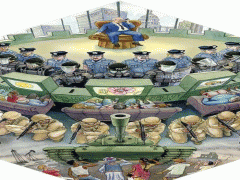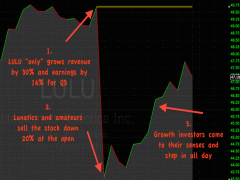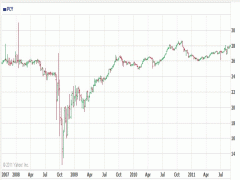CBS News’ Steve Kroft reports that members of Congress can legally trade stock based on non-public information from Capitol Hill. We’ve already discussed this type of corruption in the past, and it’s great to see the issue receive so much more widespread publicity… You also see by Nancy Pelosi’s attitude how a two-tiered “Rule of Law” is practically considered a “congressional entitlement” at this point. Hint to OccupyWallStreet protesters, HERE IS YOUR REAL ONE PERCENT!!! (actually, more like the truly thieving and conniving .1% who want you to grant them even more money and power)
(CBS) “The buying and selling of stock by corporate insiders who have access to non-public information that could affect the stock price can be a criminal offense, just ask hedge fund manager Raj Rajaratnam who recently got 11 years in prison for doing it. But, congressional lawmakers have no corporate responsibilities and have long been considered exempt from insider trading laws, even though they have daily access to non-public information and plenty of opportunities to trade on it.”
“So in 2004, Baird and Congresswoman Louise Slaughter introduced the STOCK Act [Stop Trading on Congressional Knowledge Act] which would make it illegal for members of Congress to trade stocks on non-public information and require them to report their stock trades every 90 days instead of once a year. .. Kroft: How far did you get with this? Baird: We didn’t get anywhere. Just flat died. Went nowhere. Kroft: How many cosponsors did you get? Baird: I think we got six. Kroft: Six doesn’t sound like a very big amount. Baird: It’s not, Steve. You– you could have– ‘National Cherry Pie Week’ and get 100 cosponsors. When Baird finally managed to get a congressional hearing on the STOCK Act, almost no one showed up. It’s reintroduced every session, but is buried so deep in the Capitol we had trouble finding congressmen who had even heard of it.”
“And former House Speaker Nancy Pelosi and her husband have participated in at least eight IPOs. One of those came in 2008, from Visa, just as a troublesome piece of legislation that would have hurt credit card companies, began making its way through the House. Undisturbed by a potential conflict of interest the Pelosis purchased 5,000 shares of Visa at the initial price of $44 dollars. Two days later it was trading at $64. The credit card legislation never made it to the floor of the House.”
“In the past few years a whole new totally unregulated, $100 million dollar industry has grown up in Washington called political intelligence. It employs former congressmen and former staffers to scour the halls of the Capitol gathering valuable non-public information then selling it to hedge funds and traders on Wall Street who can trade on it.”
“Congress: Trading stock on inside information?” Transcript
The next national election is now less than a year away and congressmen and senators are expending much of their time and their energy raising the millions of dollars in campaign funds they’ll need just to hold onto a job that pays $174,000 a year.
Few of them are doing it for the salary and all of them will say they are doing it to serve the public. But there are other benefits: Power, prestige, and the opportunity to become a Washington insider with access to information and connections that no one else has, in an environment of privilege where rules that govern the rest of the country, don’t always apply to them.
Questioning Pelosi: Steve Kroft heads to D.C.
When Nancy Pelosi, John Boehner, and other lawmakers wouldn’t answer Steve Kroft’s questions, he headed to Washington to get some answers about their stock trades.
Most former congressmen and senators manage to leave Washington – if they ever leave Washington – with more money in their pockets than they had when they arrived, and as you are about to see, the biggest challenge is often avoiding temptation.
Peter Schweizer: This is a venture opportunity. This is an opportunity to leverage your position in public service and use that position to enrich yourself, your friends, and your family.
Peter Schweizer is a fellow at the Hoover Institution, a conservative think tank at Stanford University. A year ago he began working on a book about soft corruption in Washington with a team of eight student researchers, who reviewed financial disclosure records. It became a jumping off point for our own story, and we have independently verified the material we’ve used.
Schweizer says he wanted to know why some congressmen and senators managed to accumulate significant wealth beyond their salaries, and proved particularly adept at buying and selling stocks.
Schweizer: There are all sorts of forms of honest grafts that congressmen engage in that allow them to become very, very wealthy. So it’s not illegal, but I think it’s highly unethical, I think it’s highly offensive, and wrong.
Steve Kroft: What do you mean honest graft?
Schweizer: For example insider trading on the stock market. If you are a member of Congress, those laws are deemed not to apply.
Kroft: So congressman get a pass on insider trading?
Schweizer: They do. The fact is, if you sit on a healthcare committee and you know that Medicare, for example, is– is considering not reimbursing for a certain drug that’s market moving information. And if you can trade stock on– off of that information and do so legally, that’s a great profit making opportunity. And that sort of behavior goes on.
Kroft: Why does Congress get a pass on this?
Schweizer: It’s really the way the rules have been defined. And the people who make the rules are the political class in Washington. And they’ve conveniently written them in such a way that they don’t apply to themselves.
The buying and selling of stock by corporate insiders who have access to non-public information that could affect the stock price can be a criminal offense, just ask hedge fund manager Raj Rajaratnam who recently got 11 years in prison for doing it. But, congressional lawmakers have no corporate responsibilities and have long been considered exempt from insider trading laws, even though they have daily access to non-public information and plenty of opportunities to trade on it.
Schweizer: We know that during the healthcare debate people were trading healthcare stocks. We know that during the financial crisis of 2008 they were getting out of the market before the rest of America really knew what was going on.
In mid September 2008 with the Dow Jones Industrial average still above ten thousand, Treasury Secretary Hank Paulson and Federal Reserve Chairman Ben Bernanke were holding closed door briefings with congressional leaders, and privately warning them that a global financial meltdown could occur within a few days. One of those attending was Alabama Representative Spencer Bachus, then the ranking Republican member on the House Financial Services Committee and now its chairman.
Schweizer: These meetings were so sensitive– that they would actually confiscate cell phones and Blackberries going into those meetings. What we know is that those meetings were held one day and literally the next day Congressman Bachus would engage in buying stock options based on apocalyptic briefings he had the day before from the Fed chairman and treasury secretary. I mean, talk about a stock tip.
While Congressman Bachus was publicly trying to keep the economy from cratering, he was privately betting that it would, buying option funds that would go up in value if the market went down. He would make a variety of trades and profited at a time when most Americans were losing their shirts.
Congressman Bachus declined to talk to us, so we went to his office and ran into his Press Secretary Tim Johnson.
Kroft: Look we’re not alleging that Congressman Bachus has violated any laws. All…the only thing we’re interested in talking to him is about his trades.
Tim Johnson: Ok…Ok that’s a fair enough request.
What we got was a statement from Congressman Bachus’ office that he never trades on non-public information, or financial services stock. However, his financial disclosure forms seem to indicate otherwise. Bachus made money trading General Electric stock during the crisis, and a third of GE’s business is in financial services.
During the healthcare debate of 2009, members of Congress were trading healthcare stocks, including House Minority Leader John Boehner, who led the opposition against the so-called public option, government funded insurance that would compete with private companies. Just days before the provision was finally killed off, Boehner bought health insurance stocks, all of which went up. Now speaker of the House, Congressman Boehner also declined to be interviewed, so we tracked him down at his weekly press conference.
Kroft: You made a number of trades going back to the healthcare debate. You bought some insurance stock. Did you make those trades based on non-public information?
John Boehner: I have not made any decisions on day-to-day trading activities in my account. And haven’t for years. I don’t– I do not do it, haven’t done it and wouldn’t do it.
Later Boehner’s spokesman told us that the healthcare trades were made by the speaker’s financial advisor, who he only consults with about once a year.
[Peter Schweizer: We need to find out whether they're part of a blind trust or not.]
Peter Schweizer thinks the timing is suspicious, and believes congressional leaders should have their stock funds in blind trusts.
Schweizer: Whether it’s uh– $15,000 or $150,000, the principle in my mind is that it’s simply wrong and it shouldn’t take place.
But there is a long history of self-dealing in Washington. And it doesn’t always involve stock trades.
Congressmen and senators also seem to have a special knack for land and real estate deals. When Illinois Congressman Dennis Hastert became speaker of the House in 1999, he was worth a few hundred thousand dollars. He left the job eight years later a multi-millionaire.
Jan Strasma: The road that Hastert wants to build will go through these farm fields right here.
In 2005, Speaker Hastert got a $207 million federal earmark to build the Prairie Parkway through these cornfields near his home. What Jan Strasma and his neighbors didn’t know was that Hastert had also bought some land adjacent to where the highway is supposed to go.
Strasma: And five months after this earmark went through he sold that land and made a bundle of money.
Kroft: How much?
Strasma: Two million dollars.
Kroft: What do you think of it?
Strasma: It stinks.
We stopped by the former speaker’s farm, to ask him about the land deal, but he was off in Washington where he now works as a lobbyist. His office told us that property values in the area began to appreciate even before the earmark and that the Hastert land was several miles from the nearest exit.
But the same good fortune befell former New Hampshire Senator Judd Gregg, who helped steer nearly $70 million dollars in government funds towards redeveloping this defunct Air Force base, which he and his brother both had a commercial interest in. Gregg has said that he violated no congressional rules.
It’s but one more example of good things happening to powerful members of Congress. Another is the access to initial public stock offerings, the opportunity to buy a new stock at insider prices just as it goes on the market. They can be incredibly lucrative and hard to get.
Schweizer: If you were a senator, Steve, and I gave you $10,000 cash, one or both of us is probably gonna go to jail. But if I’m a corporate executive and you’re a senator, and I give you IPO shares in stock and over the course of one day that stock nets you $100,000, that’s completely legal.
And former House Speaker Nancy Pelosi and her husband have participated in at least eight IPOs. One of those came in 2008, from Visa, just as a troublesome piece of legislation that would have hurt credit card companies, began making its way through the House. Undisturbed by a potential conflict of interest the Pelosis purchased 5,000 shares of Visa at the initial price of $44 dollars. Two days later it was trading at $64. The credit card legislation never made it to the floor of the House.
Congresswoman Pelosi also declined our request for an interview, but agreed to call on us if we attended a news conference.
Kroft: Madam Leader, I wanted to ask you why you and your husband back in March of 2008 accepted and participated in a very large IPO deal from Visa at a time there was major legislation affecting the credit card companies making its way through the– through the House.
Nancy Pelosi: But–
Kroft: And did you consider that to be a conflict of interest?
Pelosi: The– y– I– I don’t know what your point is of your question. Is there some point that you want to make with that?
Kroft: Well, I– I– I guess what I’m asking is do you think it’s all right for a speaker to accept a very preferential, favorable stock deal?
Pelosi: Well, we didn’t.
Kroft: You participated in the IPO. And at the time you were speaker of the House. You don’t think it was a conflict of interest or had the appearance–
Pelosi: No, it was not–
Kroft: –of a conflict of interest?
Pelosi: –it doesn’t– it only has appearance if you decide that you’re going to have– elaborate on a false premise. But it– it– it’s not true and that’s that.
Kroft: I don’t understand what part’s not true.
Pelosi: Yes sir. That– that I would act upon an investment.
Congresswoman Pelosi pointed out that the tough credit card legislation eventually passed, but it was two years later and was initiated in the Senate.
Pelosi: I will hold my record in terms of fighting the credit card companies as speaker of the House or as a member of Congress up against anyone.
Corporate executives, members of the executive branch and all federal judges are subject to strict conflict of interest rules. But not the people who write the laws.
Schweizer: If you are a member of Congress and you sit on the defense committee, you are free to trade defense stock as much as you want to if you’re on the Senate banking committee you can trade bank stock as much as you want and that regularly goes on– in– in all these committees.
Brian Baird: There should only be one thing in your mind when you’re drafting legislation, ‘Is this good for the United States of America?’ That’s it. If you’re starting to say to yourself ‘how’s this going to affect my investments,’ you’ve got– you’ve got a mixed agenda and a mixed purpose for being there.
Brian Baird is a former congressman from Washington state who served six terms in the house before retiring last year. He spent half of those 12 years trying to get his colleagues to prohibit insider trading in Congress and establish some rules governing conflicts of interest.
Baird: One line in a bill in Congress can be worth millions and millions of dollars. There was one night, we had a late, late night caucus and you could kind of tell how a vote was going to go the next day. I literally walked home and I thought, ‘Man, if you– if you went online and made– some significant trades, you could make a lot of money on this.’ You– you could just see it. You could see the potential here.
So in 2004, Baird and Congresswoman Louise Slaughter introduced the STOCK Act which would make it illegal for members of Congress to trade stocks on non-public information and require them to report their stock trades every 90 days instead of once a year.
Kroft: How far did you get with this?
Baird: We didn’t get anywhere. Just flat died. Went nowhere.
Kroft: How many cosponsors did you get?
Baird: I think we got six.
Kroft: Six doesn’t sound like a very big amount.
Baird: It’s not, Steve. You– you could have– ‘National Cherry Pie Week’ and get 100 cosponsors.
When Baird finally managed to get a congressional hearing on the STOCK Act, almost no one showed up. It’s reintroduced every session, but is buried so deep in the Capitol we had trouble finding congressmen who had even heard of it.
Kroft: Have you ever heard of the STOCK Act?
Steve Palazzo: The what?
Kroft: The STOCK Act. Do you know anything about it?
Congressman: No.
Kroft: Congressman. Congressman. Congressman.
Congressman Quayle: I haven’t heard about that one yet.
Kroft: Have you ever heard of something called the STOCK Act?
Congressman Watt: No.
Male voice: I’ve heard about, but not. I can’t say it’s an issue I’ve spent a lot of time on.
Male voice: I would have no problem with that.
Kroft: Okay.
Male voice: But then again I am a big fan of, you know, instant disclosure on almost everything.
Kroft: They’re looking for co-sponsors.
Male voice: And yet, I’ve never heard of it.
Baird: When you have a bill like this that makes so much sense and you can’t get the co-sponsorships, you can’t get the leadership to move it, it gets tremendously frustrating. Set aside that it’s the right thing to do, it’s good politics. People want their Congress to function well. It still baffles me.
But what baffles Baird even more is that the situation has gotten worse. In the past few years a whole new totally unregulated, $100 million dollar industry has grown up in Washington called political intelligence. It employs former congressmen and former staffers to scour the halls of the Capitol gathering valuable non-public information then selling it to hedge funds and traders on Wall Street who can trade on it.
Baird: Now if you’re a political intel guy. And you get that information. Long before it’s public. Long before somebody wakes up the next morning and reads or watches the television or whatever, you’ve got it. And you can make real– real-time trades before anybody else.
Baird says its taken what would be a criminal enterprise anyplace else in the country and turned it into a profitable business model.
Baird: The town is all about people saying– what do you know that I don’t know. This is the currency of Washington, D.C. And it’s that kind of informational currency that translates into real currency. Maybe it’s over drinks maybe somebody picks up a phone. And says you know just to let you know it’s in the bill. Trades happen. Can’t trace ‘em. If you can trace ‘em, it’s not illegal. It’s a pretty great system. You feel like an idiot to not take advantage of it.
No Comments »
 RSS feed for comments on this post. TrackBack URL
RSS feed for comments on this post. TrackBack URL


















